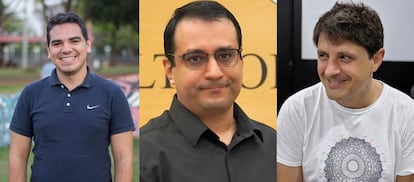New experiments on the quantum property that baffled Einstein


One of the reasons Albert Einstein disapproved of quantum physics is that it seems to predict instantaneous actions at a distance, influences that seem to propagate faster than the speed of light. In 2022, Alain Aspect, John Clauser, and Anton Zeilinger were awarded the Nobel Prize in Physics for their experiments confirming quantum “nonlocality”: the existence of correlations that cannot be explained by “hidden variable” theories in which observers have free will (to choose which measurements to make) and in which communication at speeds faster than the speed of light is impossible. However, the Nobel-winning experiments do not clarify the responsible mechanism. One possibility is that hidden variables determine which measurements are made: the free will that physicists believe they have would be an illusion. Another possibility is that superluminal communication is possible. A third possibility is that hidden variables do not exist.
An article published in Nature Communications by Carlos Vieira, Ravishankar Ramanathan, and Adán Cabello, from the universities of Campinas (Brazil), Hong Kong, and Seville, respectively, states that it is possible to conduct new experiments that will allow us to decide between these possibilities.
“At least one of the assumptions behind local hidden variable theories must fail. Here [in the Nature Communications article] we show that if only one fails, then it must fail completely, thereby ruling out hidden variable theories that partially restrict free will or partially allow instantaneous actions at a distance,” the researchers argue.
Nicolas Gisin of the University of Geneva in Switzerland tells New Scientist that the work could help dispel some of the misconceptions about why quantum theory is “nonlocal”: “The experimental violation of Bell’s inequality is established. It’s already been done. But you always have to add assumptions if you want to have a theorem,” says Gisin.
“We've been doing this for 100 years, with everyone giving their opinion. But we're supposed to be doing science. Our work, with all the intentions in the world, is completely aseptic. You have to look at what the experiments say. Someone might be repulsed by the lack of free will, but it's a logical possibility. So, as such, we're going to study it scientifically. Someone might be repulsed, like Einstein, by instantaneous actions at a distance, but it's a logical possibility in this debate, so we're going to try to explore it scientifically. It's not a matter of opinion; we're going to the lab to see what happens,” Adán Cabello argues.
The question of the lack of free will can also fuel belief in superdeterminism, a concept that Argentine astrophysicist and philosopher Gustavo E. Romero summarizes: “In everyday language, it would mean that all events in the universe are determined by a common beginning. All states were defined by a past state. In other words, there is strict determinism in the universe.”
“In my opinion, there are philosophical reasons to think that free will doesn't exist, and that it doesn't make sense,” Romero argued in a recent interview: “If you look at the cosmological context, the entire universe was originally so compact that, basically, all systems were causally connected to one another. Human beings obey natural laws in the same way as everything else that exists, everything that is natural.”
Aside from the philosophical variables, the research of Vieira, Ramanathan, and Cabello has practical applications. Cabello points out that, in cryptography, the level of security would be increased. “In current systems, it is assumed that the adversary cannot decide what measures are taken. However, the adversary could hack the random number generators used to choose the measures and compromise security. What we show is that security can be restored even in this case, provided that the hacking is only partial.”
There are also practical applications for quantum computers. In this regard, Ramanathan tells New Scientist that quantum computers can benefit from the discovery because the problem of some parts of the computer having unwanted influences on other parts can be mitigated.
EL PAÍS

%3Aformat(jpg)%3Aquality(99)%3Awatermark(f.elconfidencial.com%2Ffile%2Fbae%2Feea%2Ffde%2Fbaeeeafde1b3229287b0c008f7602058.png%2C0%2C275%2C1)%2Ff.elconfidencial.com%2Foriginal%2F6f5%2Fa5a%2Ffb5%2F6f5a5afb54487ac8cd06f1b01d416f73.jpg&w=1280&q=100)
%3Aformat(jpg)%3Aquality(99)%3Awatermark(f.elconfidencial.com%2Ffile%2Fbae%2Feea%2Ffde%2Fbaeeeafde1b3229287b0c008f7602058.png%2C0%2C275%2C1)%2Ff.elconfidencial.com%2Foriginal%2F113%2F965%2F784%2F113965784fc71a2a6c76b8b3059cd301.jpg&w=1280&q=100)

%3Aformat(jpg)%3Aquality(99)%3Awatermark(f.elconfidencial.com%2Ffile%2Fbae%2Feea%2Ffde%2Fbaeeeafde1b3229287b0c008f7602058.png%2C0%2C275%2C1)%2Ff.elconfidencial.com%2Foriginal%2F9b7%2F417%2Fb0e%2F9b7417b0e1278a5ca815a57b13052dee.jpg&w=1280&q=100)
